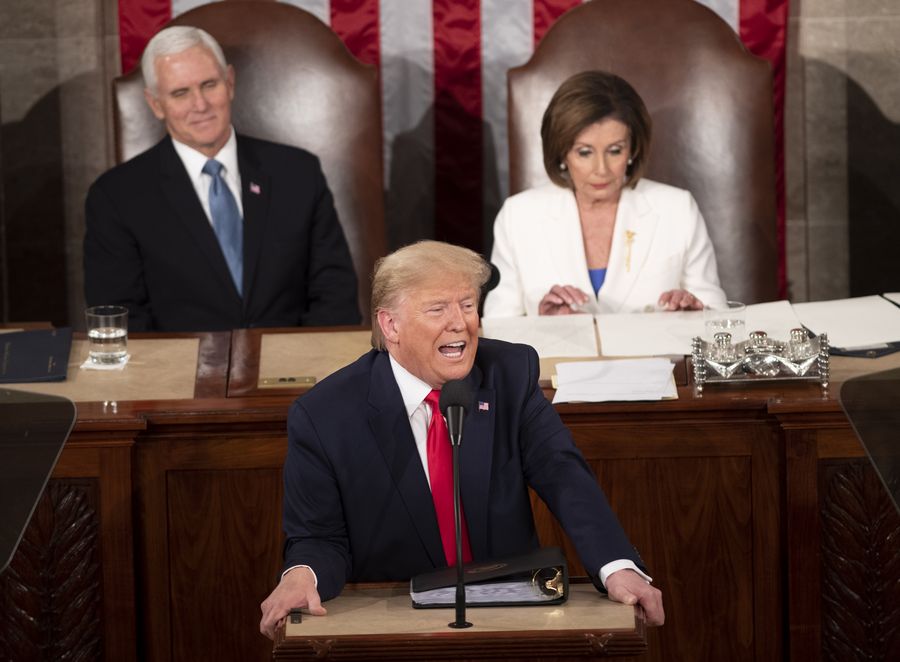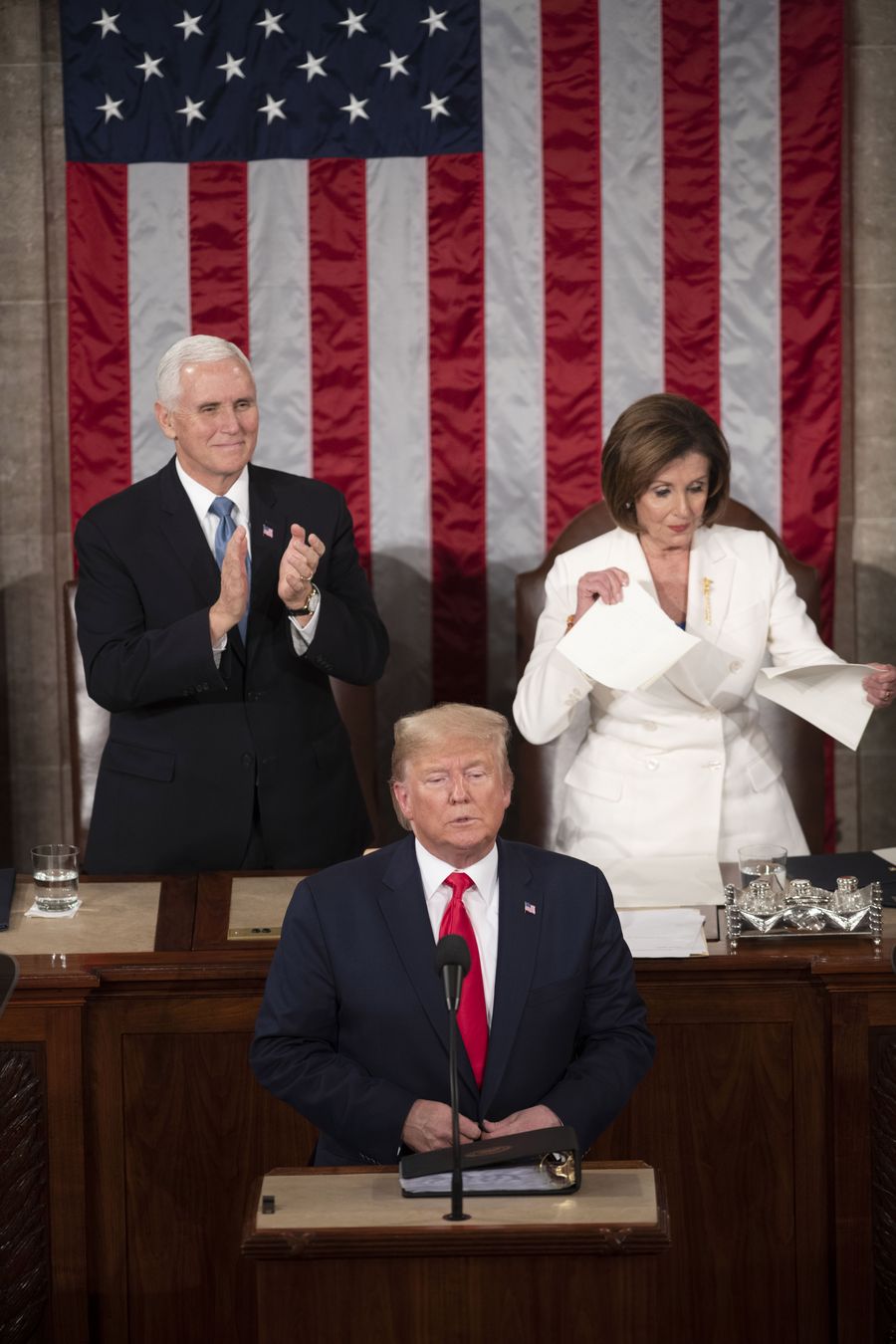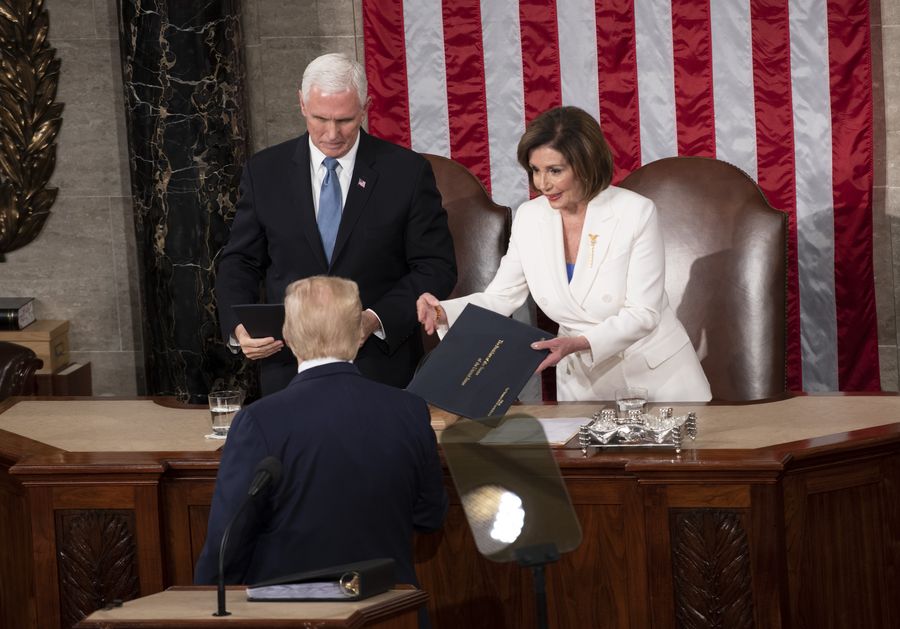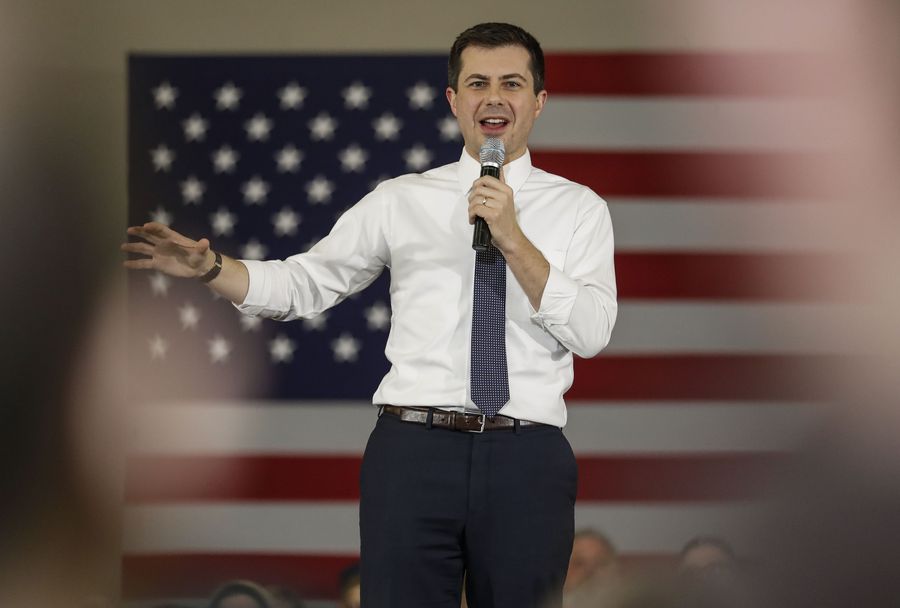U.S. Senate votes President Trump not guilty on impeachment charges, and political tussle will continue between Republicans and Democrats.
WASHINGTON, Feb. 5 (Xinhua) -- A sharply-divided U.S. Senate voted to acquit President Donald Trump on Wednesday on both articles of impeachment the House approved late last year, putting an end to a months-long proceeding that has been fueling partisan tensions.
However, the political tussle between Republicans and Democrats, neither of whom appears in the mood to mend fences, is poised to continue, as the nation's election battles this year are heating up, according to experts and pundits.

A protester holding a poster stands in front of the Capitol in Washington D.C., the United States, Feb. 3, 2020. (Xinhua/Liu Jie)
IMPEACHMENT DRAMA
On the final day of the Senate trial of Trump's impeachment, U.S. senators voted 52 to 48 to reject the first charge of abuse of power, and 53 to 47 against the second charge of obstruction of Congress, both not enough to convict the president and remove him from office.
The acquittal was widely expected as Republicans, largely unified during the impeachment proceeding, control the Senate, making it almost impossible for the 67-vote conviction threshold to be reached.

U.S. President Donald Trump delivers his State of the Union address to a joint session of Congress on Capitol Hill in Washington D.C., the United States, Feb. 4, 2020. (Xinhua/Liu Jie)
There was also a surprise: Senator Mitt Romney, a Republican from Utah, broke from the party by voting "guilty" on the abuse of power charge against Trump, becoming the only member of the chamber who crossed party lines and the first in the U.S. history to convict a president from the same party in an impeachment trial.
The vote of Romney, an outspoken Trump critics and the 2012 GOP presidential nominee, drew the ire of the White House, which, in a statement, lashed out at Romney over standing with Democrats to support what it called "manufactured impeachment article."
Trump, in a tweet after the votes, said that he will make a public statement Thursday at the White House to discuss what he calls the nation's "VICTORY on the Impeachment Hoax."
House Speaker Nancy Pelosi, who led the chamber's impeachment drive against Trump, said in a statement that the president and Senate Republicans "have normalized lawlessness and rejected the system of checks and balances."
"By suppressing the evidence and rejecting the most basic elements of a fair judicial process, the Republican Senate made themselves willing accomplices to the President's cover-up," Pelosi said.
The Pelosi-led House impeached Trump in December after an inquiry triggered by a whistleblower complaint that raised concerns about the White House's interaction with Ukraine.

U.S. Senate Majority Leader Mitch McConnell speaks during a press conference following a vote in the U.S. Senate to acquit President Donald Trump on impeachment on Capitol Hill in Washington D.C., the United States, Feb. 5, 2020. (Photo by Ting Shen/Xinhua)
The U.S. public remains split on Trump's impeachment case. According to the latest national NBC News/Wall Street Journal poll, 46 percent of registered voters say Trump should be removed from office as a result of the Senate trial, whereas 49 percent say he should remain.
"We've been through an impeachment inquiry in the House, a trial in the Senate, and America's attitudes about Donald Trump have hardly budged," said Democratic pollster Jeff Horwitt of Hart Research Associates.
PARTISAN BITTERNESS
Monday's votes came less than 24 hours after Trump delivered his State of the Union address to a joint session of Congress on Capitol Hill.
In the 78-minute, campaign-style speech, Trump mostly focused on his policy results of the first term, making his case for another four years without directly mentioning it, triggering applauses from Republicans and boos from Democrats.
Though the president refrained from taking advantage of the nationally-televised occasion to bash Democrats over his impeachment, he held back touching upon unity, a topic highlighted in his first two State of the Union speeches. Meanwhile, barely did he talk about bipartisanship.
Dan Mahaffee, senior vice president and director of policy at the Center for the Study of Congress and the Presidency, told Xinhua that the speech "reflected a closely divided nation and the rancor" between the political parties.
Two stunning moments may well capture the deteriorating relationship between the two sides: Trump, before starting his remarks, appeared to snub Pelosi's offer of a handshake; when the president finished speaking, the House's top Democrat ripped up her copy of the speech.

House Speaker Nancy Pelosi (R, back) tears up what appeared to be a copy of the president's speech during U.S. President Donald Trump's (front) State of the Union address to a joint session of Congress on Capitol Hill in Washington D.C., the United States, Feb. 4, 2020. (Xinhua/Liu Jie)
"The manifesto of mistruths presented in page after page of the address tonight should be a call to action for everyone who expects truth from the President and policies worthy of his office and the American people," Pelosi said in a statement on Trump's speech.
The White House and Republicans blasted Pelosi, who, was re-elected as the House speaker last year, after Democrats regained a majority in the chamber in the 2018 midterm elections, for tearing up her copy of speech, with some demanding an apology.
"Impeachment has completely soured relations between the parties," Brookings Institution Senior Fellow Darrell West told Xinhua. "Neither side trusts the other and that will not change any time soon. The extreme partisanship likely will continue for the foreseeable future."

House Speaker Nancy Pelosi (R, back) reaches out to shake the hands of U.S. President Donald Trump (front), which the president ignored, during Trump's State of the Union address to a joint session of Congress on Capitol Hill in Washington D.C., the United States, Feb. 4, 2020. (Xinhua/Liu Jie)
ELECTION YEAR
The endgame of the impeachment trial and the State of the Union address coincided with the kick-off of the nation's 2020 presidential primary.
Iowa, a Midwestern state, held Democratic and Republican caucuses Monday night, the first-in-the-nation nominating contest that brought tens of thousands of Iowa's registered voters to churches, public libraries and school gyms for discussions about their presidential preferences.

Democratic presidential candidate Pete Buttigieg, former mayor of South Bend, speaks at a rally in Cedar Rapids, Iowa, the United States, on Feb. 1, 2020. (Photo by Joel Lerner/Xinhua)
Trump won the Republican caucuses in a largely symbolic vote as he was facing no significant challenge. In the 2016 presidential election, he won "The Hawkeye State" by 9.5 percentage points against his Democratic rival, Hillary Clinton.
On the other side, a "coding issue" in a mobile application used to collect data for the Democratic caucuses in Iowa has caused a delay in announcing the full results.
With 96 percent of Iowa's precincts reporting, Pete Buttigieg, former mayor of South Bend, Indiana, is leading with 26.4 percent of state delegates, closely followed by Senator Bernie Sanders standing at 25.7 percent.
Senator Elizabeth Warren and former U.S. Vice President Joe Biden round out the top four with 18.3 percent and 15.8 percent, respectively, while Senator Amy Klobuchar, garnering 12.2 percent, takes the fifth place. No other candidates received double-digit support.

Democratic presidential candidate and U.S. Senator Bernie Sanders speaks at a rally at Cedar Rapids, Iowa, the United States, Feb. 2, 2020. (Photo by Joel Lerner/Xinhua)
Addressing impact of Trump's impeachment on the presidential election, West said he believes it "has mobilized the base within each party" in the short run, while stressing that major issues, such as economy, will determine the election.
As the nation is awaiting the full Iowa Democratic caucuses results, the presidential race has already shifted to New Hampshire state, with a still crowded field of Democrats blanketing the state ahead of its Tuesday primary.

Democratic presidential candidate Joe Biden, former U.S. vice president, attends a caucus night rally with his wife Jill Biden at Drake University in Des Moines, Iowa, the United States, Feb. 3, 2020. (Photo by Joel Lerner/Xinhua)
Trump will also go on campaign trail next week -- he's scheduled to attend a rally in Manchester, New Hampshire, on Monday.
(Video Reporters: Sun Ding, Hu Yousong; Video editor: Chen Sihong)■



